5 Major Causes of Drywall Cracks
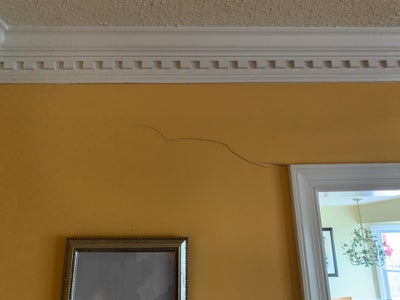
Seeing cracks in your drywall? It might be more than just a cosmetic issue. Sometimes, wall cracks are a sign of foundation damage that can affect your home’s safety in the long run.
Understanding the reasons behind them will help keep your home strong and secure. Here, we’ll dive into the most common causes of drywall cracks and how Groundworks can help you tackle them.
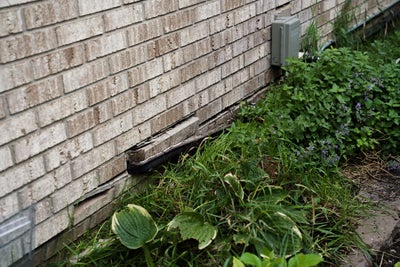
1. Foundation Movement or Settlement
The biggest reason for drywall cracks is foundation movement or settlement. What does this mean? Over time, the ground under your home can shift because of soil changes, weather, or construction issues.
This movement puts stress on your entire home, leading to cracks in the drywall. Fixing foundation issues quickly can prevent more damage and keep your home steady.
2. Temperature and Humidity Changes
Changes in temperature and humidity can make the materials in your home, like drywall and wood, expand and contract. This can cause cracks, especially in places with big weather changes. Keeping your indoor humidity under control and having good insulation can help keep these effects in check.
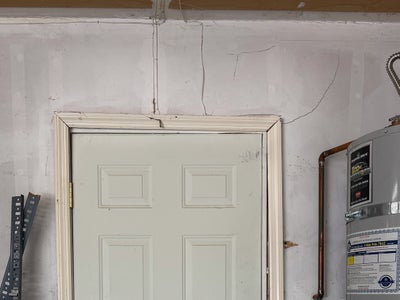
3. Poor Drywall Installation
Sometimes, drywall starts to crack because it wasn’t installed right. This includes not fastening the drywall properly, bad taping, or not preparing for natural movement (most homes move a little bit over time). Making sure professionals install your drywall correctly can help avoid these annoying issues.
4. Structural Overload
Putting too much weight on the upper floors of a home can strain the whole structure, causing drywall cracks. This often happens when attics are turned into living spaces without proper support. Before making big changes, it’s smart to talk to structural engineers to avoid this problem.
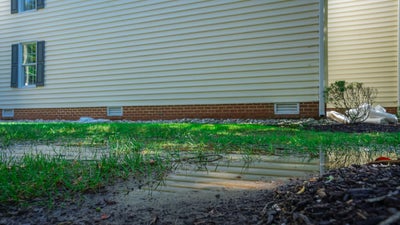
5. Water Damage
Leaks from roofs, basements, plumbing, or windows can weaken drywall and cause cracks. These cracks often come with water stains or mold.
Fixing foundation water damage quickly and making sure water drains properly around your home are key steps to preventing water damage. Consider updating your gutter system or installing interior drainage in your basement or crawl space.
How Foundation Movement Causes Drywall Cracking
When your home’s foundation moves, it can cause drywall cracking for a few reasons:
- Structural Stress and Strain: The foundation supports your whole home. Any shift in the foundation puts stress on the walls and ceilings, causing cracks in the drywall.
- Uneven Load Distribution: Foundation shifts make the weight of your home become unevenly distributed. This puts more stress on certain parts of the structure and may cause drywall to crack.
- Expansion and Contraction: Temperature and moisture changes make building materials expand and contract. Foundation movement makes these natural movements worse, causing drywall cracks.
- Weaker Sections of Drywall: The drywall around doorways, windows, and corners of rooms has less structural support, making them more likely to crack when your foundation moves.
- Compromised Structural Integrity: Foundation movement weakens your home’s overall sturdiness. This might cause visible drywall cracks and affect the framing behind the walls.
Why Fixing Drywall Cracks is Important
Fixing drywall cracks quickly is important for several reasons:

- Protect Your Loved Ones: Foundation problems are dangerous, fixing them protects your loved ones from injury.
- Prevent Further Damage: Cracks can show deeper problems. Ignoring them can lead to more serious structural issues.
- Save Money: Early repairs can limit damage and keep repair costs lower.
- Lower the Risk of Moisture and Pests: Cracks can let in moisture and pests, leading to mold and infestations.
Contact Groundworks for Expert Foundation Repair Solutions
If you see cracks in your drywall, it’s important to address the underlying foundation problems. Groundworks offers solutions to stabilize and repair your foundation, keeping your home safe and stable.
Depending on your home’s needs, different types of foundation piers might be needed, like:
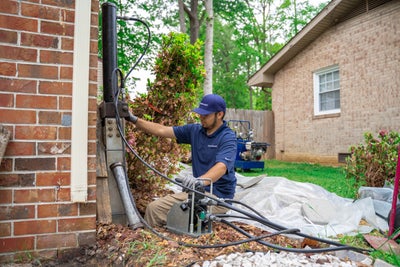
- Slab Piers: Good for homes with concrete slab foundations, slab piers are installed directly under the concrete slab to provide support.
- Push or Helical Piers: Usable for most homes, push piers and helical piers anchor your foundation to stable soil layers deep below the surface.
Groundworks will assess your home’s unique situation and recommend the best foundation repair solutions. Contact us today for a free inspection and keep your home safe for years to come.
Drywall Cracks FAQs
Yes, cracks can reappear if the underlying issue, foundation movement, isn’t properly addressed. That’s why DIY options, like caulk, don’t last.
Serious cracks are often wider than 1/8 inch, appear near windows and doors, or run diagonally. If in doubt, it’s best to get a professional assessment.
Ensure proper foundation support, maintain consistent indoor humidity levels, and address any water leaks as soon as possible.